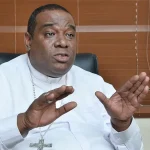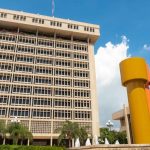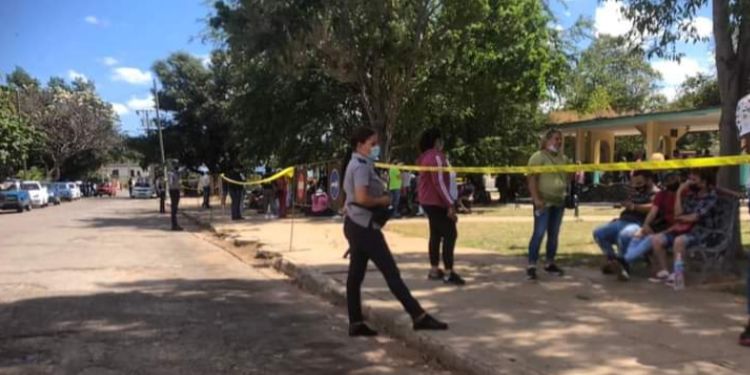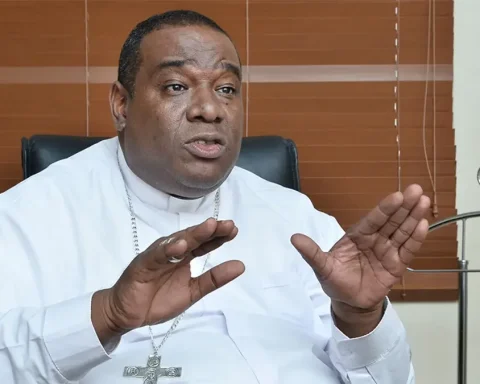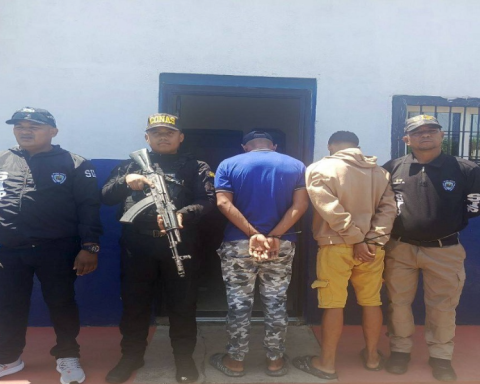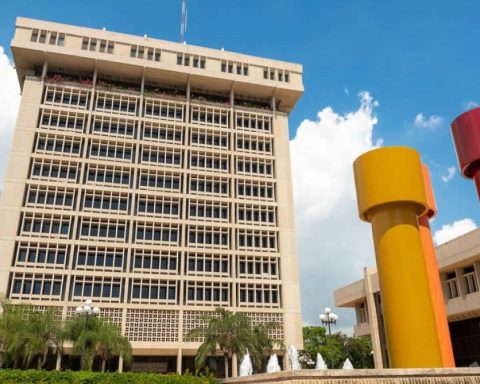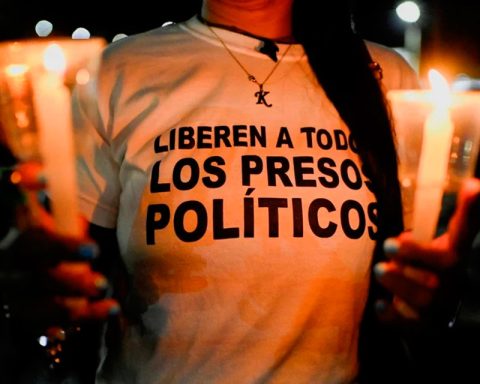
Almost all the time there are groups demonstrating on Compañía Street, in front of the side entrance to Congress. Huasos with chamantos and chupalla demanding respect for traditions; Mapuches claiming for the recovery of their lands; pro-abortion women with green scarves tied around their wrists or necks; pro-life women and priests singing church hymns around inflatable fetuses and macabre photos; evangelicals, teachers, health practitioners, trade unionists…. Trutrucas, bubucelas, drums, various cries sound, sometimes pleading, but much more often, furious. Stages are occasionally installed. When abortion was discussed, several of the most popular rockers on the scene came to sing, and this Thursday, awaiting the cultural discussion scheduled for that afternoon, the Tommy Rey orchestra arrived.
Frequently and relentlessly, a man appears who walks the entire perimeter of Congress insulting the conventional from the other side of the bars with a poster full of petitions, hanging like armor. He alleges that we are scoundrels, that the true sovereign is outside the enclosure that he guards us, he demands that we return the money that we are stealing from the people. He yells that we are traitors, some sell-outs, some bad boys. He screams desperately, as if we were torturing his daughter, at full power, with such intensity that it is hard to understand how he has a voice left behind each one of those screams, and yet he screams again with the same vehemence, power and ferocity. “Steel throat”, some call it. And when his strength weakens, he meets with idle passers-by on the corner of Banderas to lobby like the people of Buenos Aires on Paseo Florida or the people of Havana who discuss baseball in their Central Park.
There is also a small group of faithful who, every day, since the beginning of the process, set up in front of the entrance with a small stand from which hangs a sign that says: “We defend the Constituent Assembly.” They are never absent, they hand out brochures, congratulate us and encourage us when we pass by their side.
The noise is permanent and when the passion of the protesters is high, those who may be their victims choose to use the secret exit from Calle Morandé, on the other side of the building, where there is never anyone, to return to the city without being seen. But there are also the conventional ones who show up to greet their brave fans and even to cheer them on with fiery speeches when the protesters are prone to them. Sometimes, even, they are the ones who summon them.
State Reform
On Tuesday we voted on the second report of the State Form Commission. Regionalization has become one of the greatest transforming forces at the institutional level and, at the same time, and for the same reason, one of the great concerns of the Convention. In two senses: on the one hand, engine of changes, and on the other, of concerns. It is already a fact that the new Constitution will speak of the Autonomous Regions and Communes, but it does not finish reassuring the coherence in the attributions of each one. Many of the proposals have been rejected by the plenary so that they can be discussed again in the commission.
The debate around the issue has generated tensions within the groups. Socialists and Frente Amplios voted divided. As the night they presented their proposal, the Chilean team was playing and the color of rejection is red, there were those who came rowing for “La Roja de Todos”. María Rivera, a Trotskyist, was the only one who voted against everything. Her dream organization is not this, nor is she like it. They are the soviets, or something similar.
The truth is that the big changes in “the machine room” will not end up originating in the Political System commission, the sexiest and most newsworthy of all, but in this other one. In fact, the presidential regime remains, the Chamber of Deputies and Deputies, adding and subtracting, and hopefully becoming more sophisticated to generate the best possible representation and articulation (still under construction) broadly maintains the current scheme, but the Senate, whose attributions do not have been defined and are the subject of endless discussions among experts, it would be called the Chamber of the Regions and, whatever its final design -more or less asymmetrical, more or less reviewer-, it seems clear that it will dialogue with the decentralization efforts.
The filibustering of the right
On Wednesday, a part of the right, led by Rocío Cantuarias, incorporated more than two hundred indications to the replacement vote of the first block of norms of the Fundamental Rights Commission. Most of them repetitive (subsidiary indications), as a way to obstruct. “Filibusterism”, as the gringos call this pirate way of preventing them from reaching the port through civilized routes. 18 articles must be voted on and by the grace of this delaying strategy, 163 indications of which only 15 come from a group other than the right. Complained against these indications subsidiaries and the table, after deliberation, agreed to prohibit them in the future based on a regulatory norm and “its principle of effectiveness, understood as the promotion of public, simple and expeditious procedures and work methodologies, which ensure the progressive, effective and flexible progress of the Constituent Process”, as Secretary Smok read, but not now, unless its promoters were willing to withdraw them, something that the hardliners did not do, although the most open-minded did.
The vote threatens to drag on through the night, by some estimates, until 8am the next day. At about 4:30 p.m., the speeches begin. Minutes before 5:00 p.m., the same conventional Cantuarias takes the floor: “The way some of them got here was strange. Strange that they arrived with traditional outfits that they did not use in their photos on social networks, strange that they had to read speeches that it was difficult for them to speak in a language that they are supposed to know perfectly; their victimizing speeches, their lamentations… It’s also rare to come here to complain about things that happened centuries ago. The rest of the Chileans are supposed to have a historical debt with you. What debt? (…) In the regulations that you have approved you always ensure privileges for a group, yours, which you call ‘pre-existing peoples and nations’… You are political activists like any other, who only make use of a brand that has commercial purposes. Cry, victimize yourself, you are not going to manipulate us with deceit. Bow down to the conventional Linconao….Call her Machi…”. Later, Teresa Marinovic followed the same line: “You say you are a representative of the indigenous peoples, but that is false; Most of them are here, because they were guaranteed places. Say hello to Mari Mari, Kamisaraki, etc, etc, it’s not enough…Political activists, interest groups, that’s what they are”.
Margarita Vargas, from the Kaweskar people, then took the floor: “I want to leave asking for forgiveness, she said… for the way they continue to treat us…” Elisa Loncón added: “Hate speeches like the ones we hear here, violate and discriminate, reduce the human condition. Having a traditional costume is not bad… Speaking indigenous languages is not bad either… Here, with all our languages and stories, we have learned to dialogue…”.
But at times the speeches polarized. Among the acceptable arguments appeared those directed against the adversary. There have been few commissions as confrontational as the one on Fundamental Rights. The clashes are led mainly by women. Cantuarias, Marinovic and Montealegre, on the one hand, Elsa Labraña, María Ribera or Janis Meneses, on the other. The former provoke, the latter respond. The Machi Linconao speaks little, but when she does, she rules her. She always seems to be challenging the interlocutor of hers. We men enter from the side, but there the real protagonists are them.
When voted on at large, all standards passed. In particular, the first paragraph on the right to property was approved – “Every person, natural or legal, has the right to property in all its species and over all kinds of goods, except those that nature has made common to all people and that the Constitution or the law declare inappropriate”-, and the second fell: “The titles that enable the provision of public services or the exploitation, use and exploitation of common goods will not be protected by this right and will be subject to the statute that defines the law, which must safeguard the social interest and the ecological balance”.
The left-wing groups assumed that this first paragraph would be rejected by the right and would return to the commission, but the opposite happened. And several wanted, instead, that the second would last, so that when the health break arrived, at about 10 p.m., the left-wing groups urgently met in the advisors’ tent to discuss the matter. Much kicked the dog. She reigned in shock.
As the night progressed, annoyance with the right-wing strategy grew, which had us voting ridiculous. Tiredness set in.
The communists made it known to certain reserved seats that they would not support the ownership of the original peoples if a norm was not approved that included the Afro-descendant people, among them. They would calculate something, they would be up to something. If something should be recognized to the PC it is that he never acts out of simple sentimentality. And indeed, at the finals, several of them voted against giving collective ownership to the villages.
At 10:20 p.m., President Quinteros announced that we would vote until midnight and that we would resume the following morning
Let’s go again
At 9.30 on Thursday, we resume voting. At 12 o’clock, the Freedom of Expression rule was approved with two paragraphs: 1- Every person, natural or legal, has the right to freedom of expression and opinion, in any form and by any means. This right includes the freedom to seek, receive and impart information and ideas of all kinds. 2- There will be no prior censorship, but only the subsequent responsibilities determined by law.
At 4:30 p.m., article 12 was voted on: Right to identity. “Every person has the right to free development and full recognition of their identity, in all its dimensions and manifestations, including sexual characteristics, gender identities and expressions, name and sex-affective orientations.” The conventional representatives of sexual diversities gathered in front of the front, behind their colored flag. The second paragraph was then voted on: “The State shall guarantee the full exercise of this right through affirmative actions, procedures and corresponding laws.” Voting result: 108 votes in favour. They applaud. They celebrate. Barraza arrives from the next room to take photos. Further back, Jon Smok laughs with his eyes, because his mouth is covered by a mask.
The principles
On Friday, at the end of the afternoon, after a morning voting in the DDFF commission, we began to vote in plenary session on the second report of Principles.
As a new anniversary of the assassination of Jaime Guzmán is celebrated, militants of the UDI requested a minute of silence. Hugo Gutiérrez, Barraza and others, once finished, asked for the floor to claim for a gesture that, far from deserved, they considered offended the convention. Gutiérrez argued that in Germany no one would think of doing it to remember an executed Nazi. Roberto Celedón, later, recounted that he was two years below Guzmán in the UC law school, and that despite always being on opposite sides of political thought, his crime had never stopped hurting him. “Chileans, he said, we have to deeply understand that we cannot become judges of others, much less be able to decree the death of another.”
By the time we started voting, there were very few people left in the hemicycle. Before starting, from his home, by zoom, Rodrigo Logan, who is not usually seen in the Congress building, made a call to the constituents: “I would like to ask, through you -he said addressing Secretary Smok-, to tell him colleagues who come to vote. We are at an average of 145, 146 votes, and that precisely affects the vote of the majority, and therefore there are norms that should not pass and are passing… Let the table tell the colleagues to come and vote, please”. At that very moment, all those present in the hemicycle began to shout: “Let him come! Come! Come!” “Thank you very much,” Mr. Logan, replied Don John, holding back a laugh.






